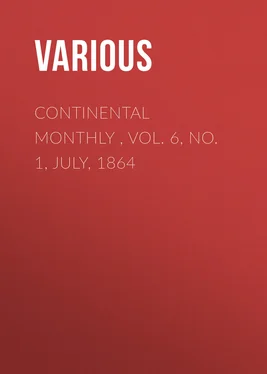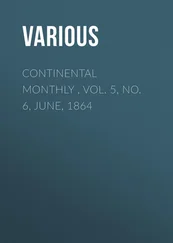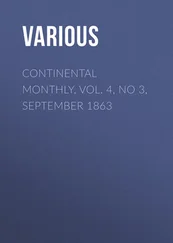Various - Continental Monthly , Vol. 6, No. 1, July, 1864
Здесь есть возможность читать онлайн «Various - Continental Monthly , Vol. 6, No. 1, July, 1864» — ознакомительный отрывок электронной книги совершенно бесплатно, а после прочтения отрывка купить полную версию. В некоторых случаях можно слушать аудио, скачать через торрент в формате fb2 и присутствует краткое содержание. Жанр: foreign_edu, periodic, Политика, на английском языке. Описание произведения, (предисловие) а так же отзывы посетителей доступны на портале библиотеки ЛибКат.
- Название:Continental Monthly , Vol. 6, No. 1, July, 1864
- Автор:
- Жанр:
- Год:неизвестен
- ISBN:нет данных
- Рейтинг книги:4 / 5. Голосов: 1
-
Избранное:Добавить в избранное
- Отзывы:
-
Ваша оценка:
- 80
- 1
- 2
- 3
- 4
- 5
Continental Monthly , Vol. 6, No. 1, July, 1864: краткое содержание, описание и аннотация
Предлагаем к чтению аннотацию, описание, краткое содержание или предисловие (зависит от того, что написал сам автор книги «Continental Monthly , Vol. 6, No. 1, July, 1864»). Если вы не нашли необходимую информацию о книге — напишите в комментариях, мы постараемся отыскать её.
Continental Monthly , Vol. 6, No. 1, July, 1864 — читать онлайн ознакомительный отрывок
Ниже представлен текст книги, разбитый по страницам. Система сохранения места последней прочитанной страницы, позволяет с удобством читать онлайн бесплатно книгу «Continental Monthly , Vol. 6, No. 1, July, 1864», без необходимости каждый раз заново искать на чём Вы остановились. Поставьте закладку, и сможете в любой момент перейти на страницу, на которой закончили чтение.
Интервал:
Закладка:
Then, as she there sat, momentarily altering her attitude to correspond the better with her ideas of proper bearing, and gathering into newer and more pleasing folds the sweeping breadths of the velvet mantle, the door was slowly swung open, and there glided noiselessly in, clad in its neat and coarse tunic, the timid figure of her old lover Cleotos.
For an instant they remained gazing at each other as though paralyzed. Cleotos—who had looked to see her in her simple white vestment as of old, and had expected at her first glance to rush to her arms, and there be allowed to pour forth his joy at again meeting her, never more to part—beheld with dismay this gorgeously arrayed and queenly figure. This could not be the Leta whom he had known, or, if so, how changed! Was this the customary attire of slaves in high-placed families? Or could it be the token of a guilty favoritism? His heart sank within him; and he stood nervously clinging against the door behind him, fearing to advance, lest, at the first step, some terrible truth, of which he had already seemed to feel the premonitions, might burst upon him.
And she, for the moment, sat aghast, not knowing but that the gods, to punish her pride and ambition, had sent a spectre to confront her. But being of strong mind and but little given to superstitious terrors, she instantly reasoned out the facts of his simultaneous captivity with herself and coincidence of ownership; and her sole remaining doubt was in what manner she should treat him. They had parted in sorrow and tears, and she knew that he now expected her to fall into his arms and there repeat her former vows of constancy and love. But that could not be. Had he come to her but an hour before, while her dreams of the future were of a vague and unsatisfactory character, she might have acted upon such an impulse. But now, a glorious vision of what might possibly happen had kindled her ambition with brighter fires than ever before; and could she surrender all that, and think again only upon starving freedom in a cottage home?
'Is it thou, Cleotos? Welcome to Rome!' she said at length, throwing from her shoulder the purple cloak, and approaching him. As she spoke, she held out her hand. He took it in his own, in a lifeless and mechanical sort of way, and gazed into her face with a strange look of inquiring doubt, which momentarily settled into an expression of deeper apprehension. The blackness of despair began to enter into his soul. Now that she was divested of her borrowed richness, she looked more like herself, and that was surely her voice uttering tones of greeting; but somehow her heart did not seem to be in them, and, for a certainty, this had not been her wonted style of welcome.
'I thought,' she continued, 'that thou wert slain. Certainly when I parted from you ere you fled into the mountains—'
'You know that I fled not at all,' he interrupted, the color mounting into his temples. 'Why do you speak so, Leta? I retired to the mountains to meet my friends there and with them carry on the defence; and, previous thereto, I conducted you to what I believed to be a place of safety. And I fought my best against the foe, and was brought nigh unto death. This I did, though I can boast of but a weak and slender frame. And it is hard that the first greeting of one so well loved as you should be a taunt.'
'Nay, forgive me,' she said. 'I doubt not your valor. It was but in forgetfulness that I spoke. I meant it not for a taunt.' And in truth she had not so meant it. It was but the inadvertent expression of a feeling which the sight of his feeble and boyish figure unwittingly made upon her—an incapacity to connect deeds of valor with apparent physical weakness. But this very inability to judge of his true nature by the soul that strove to look into her own rather than by material impressions was perhaps no slight proof of the little unison between her nature and his.
'Sit down here,' she continued, 'and tell me all that has happened to you.' And they sat together, and he briefly told her of his warlike adventures, his wound, his captivity, his recognition of herself, and his successful attempt to be once more under the same roof with her. And somehow it still seemed to him that their talk was not as of old, and that her sympathy with his misfortunes was but weak and cheerless; and though he tried to interweave the customary words of endearment with his story, there was a kind of inner check upon him, so that they came not readily to his lips as of old. And she sat, trying to listen, and indeed keeping the thread of his adventures in her mind; but all the while finding her attention fail as she speculated how she could best give that explanation of her feelings which she knew would soon be demanded of her.
'And here I am at last, Leta—as yourself, a slave!' he concluded.
'Courage, my friend!' was her answer. 'There are very many degrees and fates reserved for all in this old Rome, and much for every man to learn. And many a one who has begun as a slave has, in the end, attained not only to freedom, but to high honor and station.'
'If the gods were to give me honor and station, far be it from me to refuse the gift,' he said. 'But that, of itself alone, would not content me, unless you were there to share the good with me. And with yourself I would crave no other blessing. We are slaves here, Leta, but even that fate may have its mitigations and happiness for us.'
She was silent. How could she tell it to him? But his suspicions, at first vague, were now aroused by her very silence into more certainty.
'Tell me,' he cried, again taking her hand, 'tell me my fate; and if sorrow is to come upon me, let it come now. It seems as though there were indeed evil tidings in store for me. The blight of anticipated evil even weighed upon me ere I passed yonder hall, and when I knew no reason why I should not find you loving of heart and humble of desire as in other days. Is it all gone? Are you no longer the same? This tawdry velvet in which I found you arrayed—is it the type of a something equally foreign to your nature, and which imperial Rome has thrown about you to aid in crushing out the better feelings of your heart?'
'My friend, my brother,' she said at length, with some real pity and some false sorrow, 'why have we again met? Why is it now forced upon me to tell you that the past must always be the past with us?'
He dropped her hand, and the tears started into his eyes. Much as the words and gestures of the last few minutes had prepared him for the announcement, yet when it came, it smote him as though there had been no premonition of it; so lovingly had his heart persisted in clinging to the faint hope that he might have been mistaken. A low wail of anguish burst from his lips.
'And this is the end of all?' he sobbed.
'Think only,' she said, 'think only that I am not worthy of you.'
'The old story—the old story which has been repeated from the beginning of the world,' he cried, stung into life by something of heartlessness which he detected in her affected sympathy. 'The woman weaves her toils about the man—gilds his life until there is no brightness which can compare with it—fills his heart with high hopes of a blissful future—so changes his soul that he can cherish no thought but of her—so alters the whole tenor and purpose of his existence that he even welcomes slavery as a precious boon because it brings him under the same roof with her. And then—some other fancy having crossed her mind—or an absence of a week or two having produced forgetfulness—she insults him with a cruel mockery of self-unworthiness as her sole apology for perfidy.'
'Nay,' she exclaimed, half glad of an excuse to quarrel with him. 'If you would rather have it otherwise, think, then, that I have never loved you as I should, even though I may have imagined that I did.'
Читать дальшеИнтервал:
Закладка:
Похожие книги на «Continental Monthly , Vol. 6, No. 1, July, 1864»
Представляем Вашему вниманию похожие книги на «Continental Monthly , Vol. 6, No. 1, July, 1864» списком для выбора. Мы отобрали схожую по названию и смыслу литературу в надежде предоставить читателям больше вариантов отыскать новые, интересные, ещё непрочитанные произведения.
Обсуждение, отзывы о книге «Continental Monthly , Vol. 6, No. 1, July, 1864» и просто собственные мнения читателей. Оставьте ваши комментарии, напишите, что Вы думаете о произведении, его смысле или главных героях. Укажите что конкретно понравилось, а что нет, и почему Вы так считаете.












